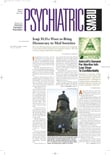While the United States spends more than any other country in the Western hemisphere on health care, reports indicate that Australia, Canada, New Zealand, and the United Kingdom scored better than the United States on safety, efficiency, effectiveness, and equity of care.
The curriculum requirements for residency education in psychiatry as detailed in the Graduate Medical Education Directory 2002-2003 describe aspects of requirements for quality assurance in one sentence as follows: “Clinical training should provide sufficient experiences in psychiatric administration, especially leadership of interdisciplinary teams, including supervised experience in utilization review, quality assurance, and performance improvement.”
It is no surprise, then, that young graduates of psychiatry residency programs leave with extensive experience in various subspecialties of psychiatry but are blind to patient safety and the quality of care rendered through improved systems of care.
A curriculum that promotes (1) knowledge in communicating with other disciplines that interdigitate care for patients, (2) assessment of suicidality of patients, (3) careful consideration of disposition difficulties in patients prone to relapse or self harm, (4) writing accurate orders for medications, and most importantly, (5) assessing one’s role in contributing to errors must be included during the training process.
An organized, continuing process of educating residents will pose the following questions:
• How can I be a better psychiatrist?
• Can I render care in a more compassionate manner?
• Can I medicate my patient with attention to safety, efficacy, tolerability, price, and simplicity of dosing in administration of medications?
• Am I communicating in the best way possible with my patients and their families and other team members who help me treat the patient?
• Is my writing legible?
• When an error has occurred, am I communicating this to my patients/families in a humane, forthright manner?
• Do I obtain adequate consultation when I am not sure of how to proceed?
• Am I educating myself in a continuing manner so as to improve my skills in the care of my patients?
“Safe” psychiatry is synchronous with patient-centered care. When delivering patient-centered care, we must improve quality through direct interventions in the health care delivery process. For example, we must decrease long waits in the emergency department prior to hospitalization, and we must provide prompt access to outpatient psychiatric care for chronically mentally ill people.
A multidisciplinary morbidity and mortality review team must examine near misses as well as negative outcomes in patient care using real-life examples as often as possible. Residents must and can provide valuable input to improve systems of care. They are often our front-line staff and the final common pathway of communication with our patients. They are also our future administrators, clinicians, and researchers. The ethics of dealing honestly with patients should become second nature to residents.
It behooves us to include teaching about patient safety and dimensions of both efficient and effective care to future generations of psychiatrists. ▪
